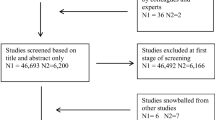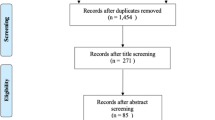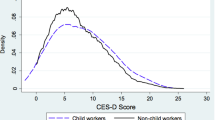Abstract
The social gradients in health typically seen in the whole UK population are attenuated/non-existent in some minority ethnic groups. This study aims to compare latent class measures to conventional measures of socioeconomic position (SEP) in the estimation of social gradients in health for women and infants of Pakistani origin in the Born in Bradford cohort. We compare social gradients in birth outcomes, smoking during pregnancy, and maternal mental health using various measures of SEP (including latent class analysis groups) with multivariate regression models. Social gradients in maternal mental health and low birth weight were more clearly defined than before. Otherwise, the latent class SEP variables did not reveal social gradients in health that were not obvious before. This study adds to the evidence that there are weak, if any, social gradients in maternal and child health among UK women and infants of Pakistani origin when measured with these SEP variables.

Similar content being viewed by others
References
Aveyard P, Cheng KK, Manaseki S, et al. The risk of preterm delivery in women from different ethnic groups. BJOG. 2002;109(8):894–9. https://doi.org/10.1016/S1470-0328(02)01197-7.
Bhopal R, Hayes L, White M, et al. Ethnic and socioeconomic inequalities in coronary heart disease, diabetes and risk factors in Europeans and South Asians. J Public Health Med. 2002;24(2):95–105.
Fischbacher CM, Cezard G, Bhopal RS, et al. Measures of socioeconomic position are not consistently associated with ethnic differences in cardiovascular disease in Scotland: methods from the Scottish Health and Ethnicity Linkage Study (SHELS). Int J Epidemiol. 2014;43(1):129–39. https://doi.org/10.1093/ije/dyt237.
Teitler J, Reichman N, Nepomnyaschy L, et al. A cross-national comparison of racial and ethnic disparities in low birth weight in the United States and England. Pediatrics. 2007;120(5):E1182.
Thomas C, Nightingale CM, Donin A, et al. Socio-economic position and type 2 diabetes risk factors: patterns in UK children of South Asian, Black African-Caribbean and White European origin. PLoS ONE. 2012. https://doi.org/10.1371/journal.pone.0032619.
Smith GD, Chaturvedi N, Harding S, et al. Ethnic inequalities in health: a review of UK epidemiological evidence. Crit Public Health. 2000;10:375–408. https://doi.org/10.1080/09581590010005331.
Uphoff EP, Pickett KE, Wright J. Social gradients in health for Pakistani and White British women and infants in two UK birth cohorts. Ethn Health. 2015;5:452–67. https://doi.org/10.1080/13557858.2015.1091442.
Fairley L, Cabieses B, Small N, et al. Using latent class analysis to develop a model of the relationship between socioeconomic position and ethnicity: cross-sectional analyses from a multi-ethnic birth cohort study. BMC Public Health. 2014;14:835. https://doi.org/10.1186/1471-2458-14-835.
McCutcheon AL. Latent class analysis. Newbury Park: Sage; 1987.
Raynor P, Duley L, Wild C, et al. Born in Bradford, a cohort study of babies born in Bradford, and their parents: protocol for the recruitment phase. BMC Public Health. 2008;8. https://doi.org/10.1186/1471-2458-8-327.
Wright J, Small N, Raynor P, et al. Cohort profile: the Born in Bradford multi-ethnic family cohort study. Int J Epidemiol. 2013;42(4):978–91. https://doi.org/10.1093/ije/dys112.
Shah PS. Parity and low birth weight and preterm birth: a systematic review and meta-analyses. Acta Obstet Gynecol Scand. 2010;89:862–75. https://doi.org/10.3109/00016349.2010.486827.
Acevedo-Garcia D, Soobader MJ, Berkman LF. Low birthweight among US Hispanic/Latino subgroups: the effect of maternal foreign-born status and education. Soc Sci Med. 2007;65(12):2503–16. https://doi.org/10.1016/j.socscimed.2007.06.033.
Goldman N, Kimbro RT, Turra CM, et al. Socioeconomic Gradients in health for white and mexican-origin populations. Am J Public Health. 2006;96(12):2186–93. https://doi.org/10.2105/AJPH.2005.062752.
Selten JP, Van Der Ven E, Rutten BPF, et al. The social defeat hypothesis of schizophrenia: an update. Schizophr Bull. 2013;39:1180–6. https://doi.org/10.1093/schbul/sbt134.
Nazroo JY. The health of Britain's ethnic minorities: findings from a national survey. London: Policy Studies Institute; 1997.
Small N. Infant mortality and migrant health in babies of Pakistani origin born in Bradford. UK. J Intercult Stud. 2012;33(5):549–64. https://doi.org/10.1080/07256868.2012.701610.
Bourdieu P. Distinction: a social critique of the judgement of taste. Cambridge: Harvard University Press; 1984.
Adler NE, Epel ES, Castellazzo G, et al. Relationship of subjective and objective social status with psychological and physiological functioning: preliminary data in healthy white women. Health Psychol. 2000;19(6):586–92. https://doi.org/10.1037/0278-6133.19.6.586.
Marmot MG. Status syndrome : how your social standing directly affects your health and life expectancy. London: Bloomsbury; 2004.
Acknowledgements
Born in Bradford is only possible because of the enthusiasm and commitment of the children and parents in BiB. We are grateful to all participants, health professionals and researchers who have made Born in Bradford happen. We would like to acknowledge the support of Dr. Lesley Fairley, who led the work upon which this study built, and we thank Dr. Brian Kelly for preparing the dataset.
Author information
Authors and Affiliations
Corresponding author
Additional information
Publisher's Note
Springer Nature remains neutral with regard to jurisdictional claims in published maps and institutional affiliations.
Rights and permissions
About this article
Cite this article
Mallicoat, B., P Uphoff, E. & E Pickett, K. Estimating Social Gradients in Health for UK Mothers and Infants of Pakistani Origin: Do Latent Class Measures of Socioeconomic Position Help?. J Immigrant Minority Health 22, 1255–1264 (2020). https://doi.org/10.1007/s10903-020-00977-9
Published:
Issue Date:
DOI: https://doi.org/10.1007/s10903-020-00977-9




